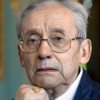Paul Ricoeur

Paul Ricoeur
Jean Paul Gustave Ricœurwas a French philosopher best known for combining phenomenological description with hermeneutics. As such, his thought is within the same tradition as other major hermeneutic phenomenologists, Martin Heidegger and Hans-Georg Gadamer. In 2000, he was awarded the Kyoto Prize in Arts and Philosophy for having "revolutionized the methods of hermeneutic phenomenology, expanding the study of textual interpretation to include the broad yet concrete domains of mythology, biblical exegesis, psychoanalysis, theory of metaphor, and narrative theory."...
NationalityFrench
ProfessionPhilosopher
Date of Birth27 February 1913
CountryFrance
The Law is one aspect of a much more concrete and encompassing relation than the relation between commanding and obeying that characterizes the imperative.
There has always been a hermeneutic problem in Christianity because Christianity proceeds from a proclamation.
What must be the nature of the world... if human beings are able to introduce changes into it?
The text is a limited field of possible constructions.
Testimony should be a philosophical problem and not limited to legal or historical contexts where it refers to the account of a witness who reports what he has seen.
It is always possible to argue against an interpretation, to confront interpretations, to arbitrate between them and to seek for an agreement, even if this agreement remains beyond our reach.
This atheism concerning the gods of men pertains hereafter to any possible faith
This is perhaps the most profound meaning of the book of Job, the best example of wisdom.
Ordinary language carries with it conditions of meaning which it is easy to recognize by classifying the contexts in which the expression is employed in a meaningful manner.
Narrative identity takes part in the story's movement, in the dialectic between order and disorder
For my own part, I abandon the ethics of duty to the Hegelian critique with no regrets; it would appear to me, indeed, to have been correctly characterized by Hegel as an abstract thought, as a thought of understanding.
Hope, insofar as it is hope of resurrection, is the living contradiction of what it proceeds from and what is placed under the sign of the Cross and death.
Myth expresses in terms of the world - that is, of the other world or the second world - the understanding that man has of himself in relation to the foundation and the limit of his existence.
So long as the New Testament served to decipher the Old, it was taken as an absolute norm.